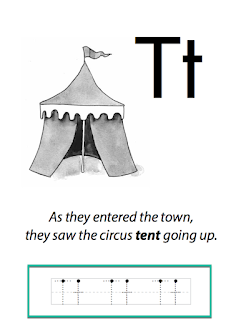At First Focus Learning Systems, we are committed to serving students of all levels of English reading, writing, and comprehension. A particular challenge we face is teaching English to students who have no prior experience of the language. These students are typically from a foreign country, or are otherwise immersed in a different language within their home community. Often, a parent will ask: ‘how will you teach my non-English speaking student to read and understand English?’
Over the past eight years, First Focus has evolved and successfully tested the “Imaginary Picture Story” to create a phonics-based foundation in English for non-English-speaking students.
First, we assign a corresponding picture to each letter in the alphabet. For example, we tell the students to imagine that the letter "b" is a "bear"" and that "t" is a "tent".
The "Imaginary Picture" story becomes the foundation for students to gain a solid understanding of the sounds of the letters. Visual imagery in our course books helps reinforce the sounds of consonants.
The next two focal points are penmanship and vowel sounds. We emphasize neat penmanship by ensuring that students:
• Make a direct connection to the "Imaginary Picture" by writing the the letter representing the sound.
• Identify and articulate if uppercase or lowercase letters are "Tall" or "Short" respectively to emphasize pencil placement
Vowel sounds for A, E, I , O and U are taught by making use of the “long vowel sound rule.” For each of these five letters, the “long vowel sound” is exactly the same as the letter’s name. For example, the letter A in cake is pronounced the same as the letter name “A.” After students are thoroughly comfortable with long vowel sounds, we move on to short vowel sounds and more complex words.
An Israeli grandmother brought her granddaughter to the First Focus summer camp for two consecutive summers. The student did not speak english at the beginning of the camp season.
By developing and following this distinct process, we have seen remarkable results when teaching non-English speakers. We’ve had the privilege of observing students—many of whom recently moved to the U.S. from countries like China or Israel—quickly ascend to a level of English knowledge that is consistent with their grade level. For more information and testimonials, check out our website: firstfocus.com or call 650-938-3100.
We welcome your questions and comments!
Authors: Vivian Mendoza and Coby Simler
Authors: Vivian Mendoza and Coby Simler


